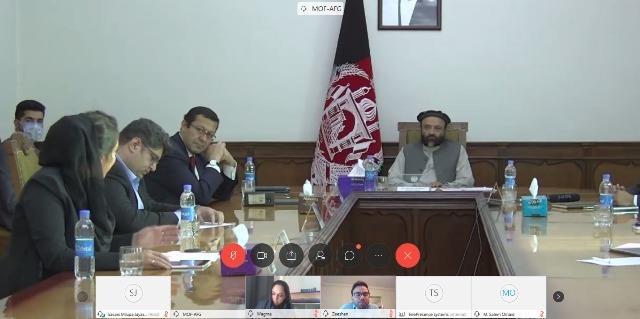
IFC, partners sign $89 million energy project deal for Afghanistan
(MENAFN- Pajhwok Afghan News) KABUL owk): a member of the World Bank Group, and partners have signed the debt financing package for Afghanistan 's first long-term public-private partnership, a statement from the International Finance Corporation (IFC) World Bank Group said on Wednesday.
The project, Mazar-e-Sharif gas-to-power plant in northern Afghanistan, will boost the country's domestic electricity generation by up to 30 percent, allowing more people access to grid electricity while reducing reliance on imports as well as costly and polluting diesel-generated power, the statement said.
The pioneering 59-megawatt power plant, with an estimated total cost of $89 million, marked a key long-term private energy investment in Afghanistan.
Only about 34 percent of Afghanistan's 37 million people have access to grid electricity and even those connected to the grid suffer from frequent power blackouts, at times lasting up to 15 hours a day.
'This is a transformational project for Afghanistan,' said Nena Stoiljkovic, IFC's Vice President for Asia and Pacific. 'It paves the way for Afghanistan to take a major step forward in reducing its reliance on imports.
It also sends a clear signal to the world that internationally bankable deals with the private sector are possible in Afghanistan.
There is now a clear model for the private sector to follow to help the country meet its development challenges, especially in uncertain times of COVID-19, which highlights the need for more reliable energy for health facilities and for the post pandemic recovery.'
Afghanistan currently imports about 75 percent of its energy needs. The Mazar power project will help Afghanistan meet its critical need for electricity using the country's domestic natural gas. It will also create about 200 direct jobs and many more indirectly.
'This project will not only allow more people in Afghanistan to have access to grid electricity, a successful IPP will motivate more private institutional investors to invest in Afghanistan,' said Daud Noorzai, CEO of Afghanistan's power utility, Da Afghanistan Breshna Sherket (DABS).
'This first of its kind project maximizes the use of private and foreign investment to help put the country on a new energy path.'
The project will be implemented by Afghan Power Plant Company, established by Ghazanfar Group, an Afghan conglomerate with more than 100 years of operations in the region, ranging from oil and gas, power, trading, banking, logistics and construction in partnership with HA Utilities, the utilities investment and development arm of Hassan Allam Holdings, an Egyptian multinational engineering and construction group operating in the Middle East and Africa since 1936.
'We went to IFC exploring avenues for developing Afghanistan, that is where Mazar IPP was born. Six years later, we are sealing a historic deal that will be the source of empowerment for Afghanistan's health, education and industrial sector,' said Ismail Ghazanfar, Chairman and CEO of Ghazanfar Group.
'This is the first step Ghazanfar Group is taking towards investing in the energy sector in our vision of a developed Afghanistan.'
The greenfield power plant, which will use gas from the Sheberghan gas fields located in the same region of the country, is expected to generate around 400 GWh of electricity annually for the residents of Mazar-e-Sharif, Kabul, and Jalalabad. It is also expected to have a multiplier effect, spurring other projects promoting renewable energy such as solar and wind in the country.
IFC and the Ghazanfar Group spent over six years developing the project, which stands as a prime example of IFC's work to create markets through upstream project preparation over many years. The financial package includes support from other organizations within the World Bank Group, including the International Development Association (IDA) and Multilateral Investment Guarantee Agency (MIGA).
IFC's financial support for the project from its own resources includes a $21.2 million senior loan and $1.5 million of client risk-management swap. In addition, as the mandated lead arranger for the project, IFC has mobilized $41.2 million in parallel loans from other lenders, including the German development finance institution DEG and the Asian Development Bank.
The World Bank Group's financing package also includes a $12 million guarantee from IDA, to help provide short-term liquidity support for ongoing payment obligations to the power utility, DABS, which will buy the power generated from the plant. MIGA will also provide investment guarantees for the project amounting to $48.7 million. IFC's financing and MIGA's political risk guarantees will be covered in part by the IDA Private Sector Window's (PSW) Risk Mitigation Facility as well as the MIGA Guarantee Facility. The project marks the first time the PSW's Risk Mitigation Facility has been used.
About IFC
IFC—a sister organization of the World Bank and member of the World Bank Group—is the largest global development institution focused on the private sector in emerging markets. We work in more than 100 countries, using our capital, expertise, and influence to create markets and opportunities in developing countries. In fiscal year 2019, we invested more than $19 billion in private companies and financial institutions in developing countries, leveraging the power of the private sector to end extreme poverty and boost shared prosperity. For more information, visit www.ifc.org .
About IDA
The World Bank Group's International Development Association (IDA) is one of the largest sources of assistance for the world's 76 poorest countries and is the single largest source of donor funds for basic social services in these countries. Overseen by 173 shareholder nations, IDA aims to reduce poverty by providing loans (called 'credits') and grants for programs that boost economic growth, reduce inequalities, and improve people's living conditions.
About the IDA Private Sector Window
As part of the record $75 billion IDA18 replenishment, the World Bank Group created the $2.5 billion IDA Private Sector Window to catalyze private sector investment in the poorest and most fragile countries. Recognizing the key role of the private sector in achieving IDA18 objectives and the Sustainable Development Goals, the window provides concessional funds for co-investment alongside IFC and Multilateral Investment Guarantee Agency (MIGA) private investments. Concessional funds help to mitigate risk and reduce barriers, which unlocks and crowds in private investment in emerging markets. For more information, visit: http://ida.worldbank.org/psw .
About MIGA
MIGA was created in 1988 as a member of the World Bank Group to promote foreign direct investment in emerging economies by helping mitigate the risks of restrictions on currency conversion and transfer, breach of contract by governments, expropriation, and war & civil disturbance; and offering credit enhancement to private investors and lenders. Since its creation, MIGA has issued over $55 billion in guarantees across 114 developing countries.
Pr/nh

Legal Disclaimer:
MENAFN provides the
information “as is” without warranty of any kind. We do not accept
any responsibility or liability for the accuracy, content, images,
videos, licenses, completeness, legality, or reliability of the information
contained in this article. If you have any complaints or copyright
issues related to this article, kindly contact the provider above.


















Comments
No comment